Thanks for reading Essential Politics!
Welcome to our archived feed. You can find the latest news over here.
Meantime, follow us on Twitter for more, or subscribe to our free daily newsletter.
Join us for the latest
Fresnoâs mayor praises Obama for federal help
Yes, you read the headline correctly.
Itâs not often that the mayor of Fresno gets a chance to speak from the lectern inside the White House briefing room, let alone a Republican mayor often talked about back home as a contender for statewide office in 2018.
But such was the case Thursday, when Mayor Ashley Swearengin praised the Obama administrationâs help for communities like hers. It was Swearengin who welcomed the president on the tarmac for his Central Valley visit in 2014.
Swearenginâs comments came in response to a question from my colleague, Michael Memoli. And while she suggested policy trumped politics, it might not hurt a GOP candidate in California to get some attention for bipartisanship.
Needless to say, the Obama team quickly tweeted out the video.
Gavin Newsom endorses Kamala Harris for U.S. Senate
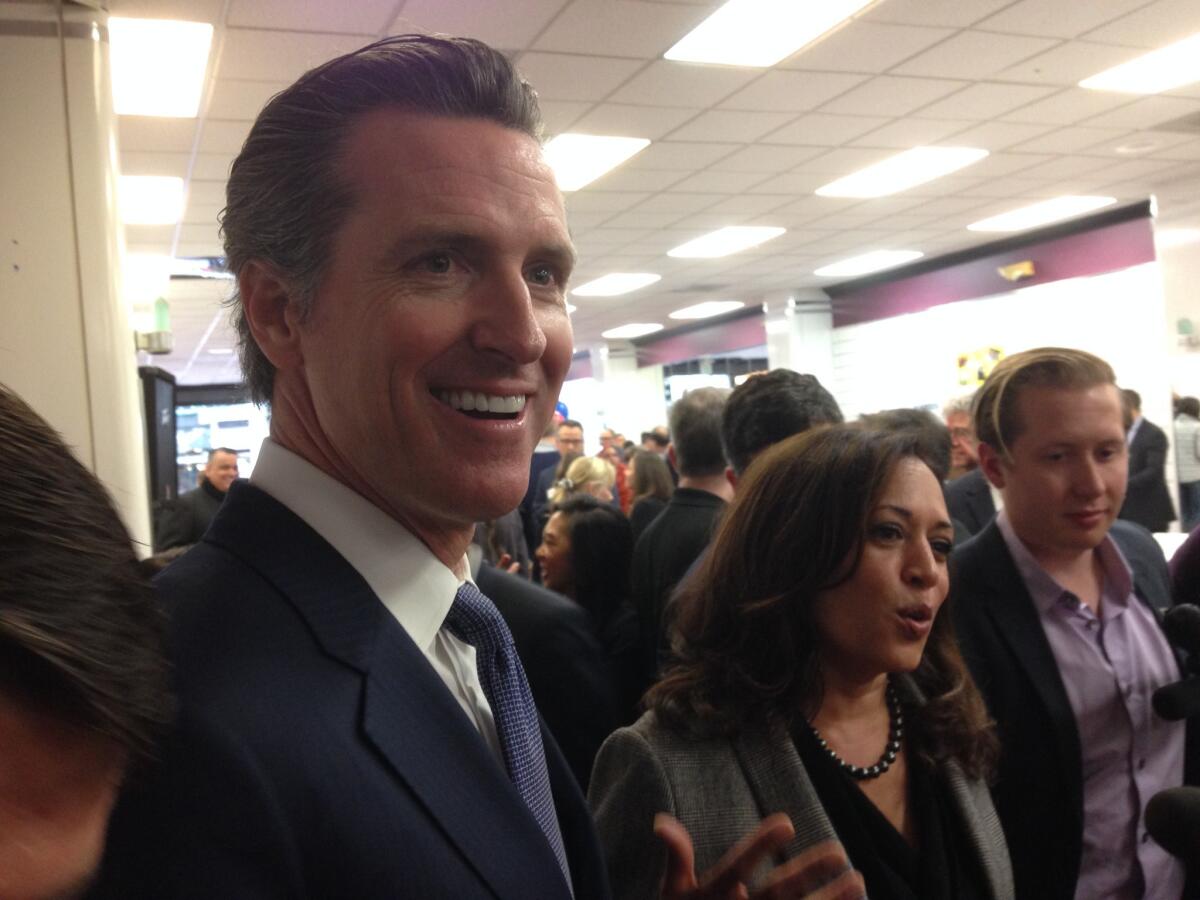
Lt. Gov Gavin Newsom on Thursday endorsed longtime friend and San Francisco political ally Atty. Gen. Kamala Harris for the U.S. Senate.
Newsom said he knew Harris long before both became major Democratic political players in San Francisco -- he as mayor and Harris as district attorney.
âIf you can survive San Francisco politics, Washington, D.C., is a cakewalk,â Newsom told a crowd of Harris supporters at her Sacramento campaign office.
Newsom, who is preparing for a 2018 bid for California governor, described Harris as an ethical and pragmatic leader, and one who cares about Californians.
Harris was first elected attorney general in 2010, and was reelected in 2014.
She told supporters that, if sent to Washington, she would make education among her top priorities. She touted her efforts to combat truancy and reduce the number of high school dropouts, and also outlined her efforts to win a $20-billion settlement from the nationâs top banks in the wake of the foreclosure crisis.
The attorney general also criticized Washington politicians who conflate immigration policy with criminal justice policy.
Harris said the overwhelming majority of immigrants who come to the United States without proper documents are decent, hardworking people.
âAn undocumented immigrant is not a criminal,â Harris said.
She acknowledged that there are exceptions, alluding to the case of five-time deportee Juan Francisco Lopez-Sanchez, who shot and killed 32-year-old Kate Steinle in San Francisco. If those individuals are found guilty, they should be âlocked up as long as we can.â
Harris is the current front-runner in the race to succeed retiring Barbara Boxer in the U.S. Senate. Her biggest rival is fellow Democrat Rep. Loretta Sanchez of Orange.
Full text of Gov. Brownâs State of the State
Miss the speech? Want to know where Gov. Jerry Brown went off-script and what was notably absent from his remarks? Fear not, you can read the full text of the State of the State, with helpful annotations from our Sacramento politics team, here.
In email to campaign supporters, Brown touts water tunnels
Gov. Jerry Brown dusted off his rarely used campaign email account to send supporters a copy of his State of the State address not long after delivering the speech. The email had the subject line âCalifornia: The Great Exceptionâ and included a prominent link to a video promoting the Sacramento-San Joaquin Delta tunnels project, which would replumb the stateâs water hub.
âOne of the key points is the need for a reliable system for moving water in California,â reads the emailâs introduction, before directing viewers to a âcool videoâ on the plan. The twin tunnels â a legacy project for the governor â were notably not mentioned in his address.
Brown weighs in on Californiaâs water wars
âWater goes to the heart of what California is and what it has been over centuries,â Gov. Jerry Brown said during his State of the State speech. âPitting fish against farmer misses the point and grossly distorts reality.â
Jerry Brown for 2018?
Gov. Jerry Brown began his State of the State address with an off-script joke about his long run as Californiaâs governor.
âThree more years to go. That is, unless I take my surplus campaign funds and put a ballot initiative on the November ballot to allow fourth-term governors to seek a final fifth term,â Brown said.
View from the floor
California ethics panel approves more detailed lobbying disclosure
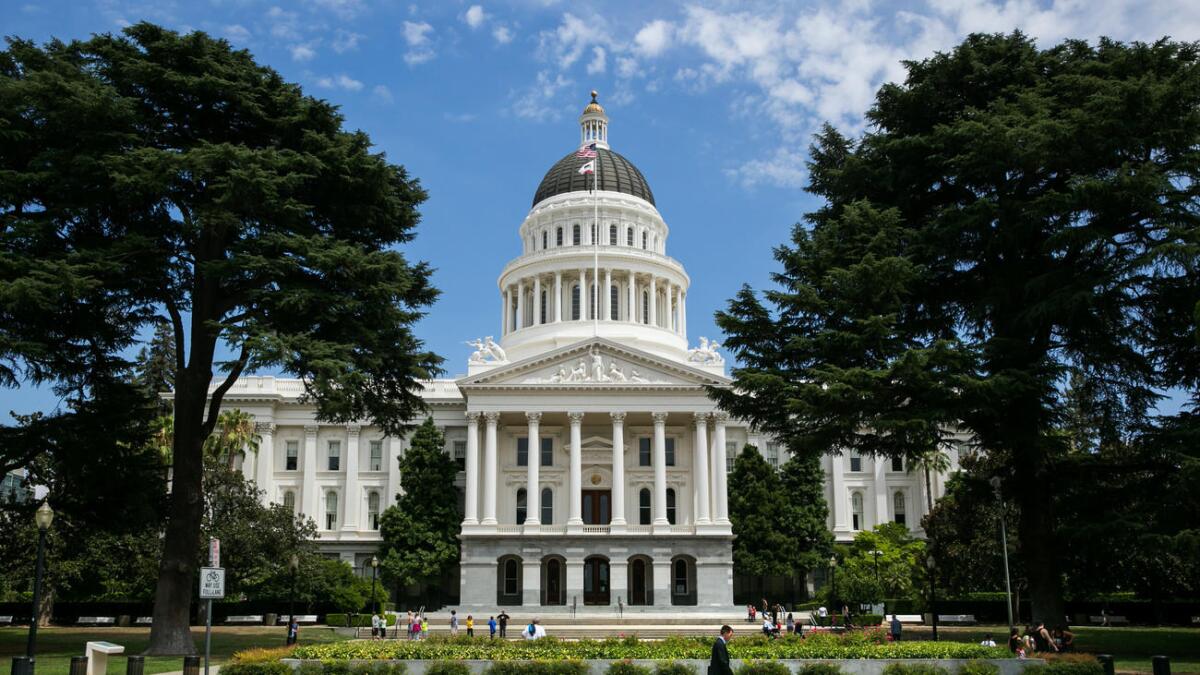
Special interest groups will have to disclose many more details of how they are spending money to influence California officials under new rules approved Thursday by the stateâs ethics panel.
Currently, corporations, labor unions and other groups must report the money they pay directly to lobbyists, along with the identity of the advocate.
But the rest of the cash they spend on consultants, television and radio campaigns, public affairs and mail is reported as a lump sum in a category called âother payments to influence,â without any explanation.
âThe amount of money that is being spent in the dark is extremely compelling,â said state Fair Political Practices Commission member Eric Casher.
The panel on Thursday voted to require, starting in July, that lobbying firms report details of any payment to influence of $2,500 per calendar quarter, including money spent on mailers, TV ads and polls.
âIn order to make sure people are playing by the rules, we need this type of information,â said Jodi Remke, chairwoman of the panel. âIt puts a light on what is going on.â
The newly disclosed information will include the name and business address of the payee, the amount paid and the primary purpose of the payment.
Purposes will be disclosed by codes broadly designating activities that include:
--Payments for public affairs, which includes coalition building, grass-roots campaigns,, news releases, media campaigns, literature and mailings.
--Polling and public opinion research:
--Lobbying events, including rallies or hearings to influence legislative or administrative action.
--Advertising spending, including billboards, print, radio, television, text, email and other electronic communication.
--Money paid to lobbyists and consultants for researching, analyzing or drafting legislation, and recommending strategy on pending bills and administrative proposals.
Remke said the new rules may reveal which former legislators are working behind the scenes to help clients without registering as lobbyists because they donât meet thresholds for payments received to directly communicate with elected officials.
Remke made reference, without using names, to former state Sen. Michael Rubio (D-Bakersfield) and former state Assemblyman Henry Perea (D-Fresno), who resigned from the Legislature to go to work in the government affairs offices of Chevron and the Pharmaceutical Research and Manufacturers of America, respectively.
âI think we are going to get [disclosure of] the people like the former members who leave the Legislature early, join Chevron, join the Pharmaceutical Research and Manufacturers, but call themselves government relations advocates,â Remke said. âBut we know what they are doing. They are exposing their clients to the [legislative] members and doing other things short of direct communication.â
âProfoundly uncertainâ world, says Brown
In a short speech with a long view of California, Gov. Jerry Brown used his State of the State address to challenge lawmakers to better balance the cyclical nature of success and setback that has dominated state government for the better part of two decades.
âThe challenge is to solve todayâs problems without making those of tomorrow even worse,â the governor said in his annual speech delivered from the Assembly chamber.
George Skelton weighs in on speech
Brown wraps up State of the State speech in less than 20 minutes
This is Brownâs 13th State of the State address
On climate, Brown says âhumankind must change its waysâ
Jerry Brown addresses budget
Gavin Newsom introduces Gov. Jerry Brown
Four more years?
Brownâs bringing back budget chart
One last prep session for Brown
The speakers, in order...
The crowd arrives for the speech
Special guests for Gov. Jerry Brownâs speech
Capitol prepares for State of the State
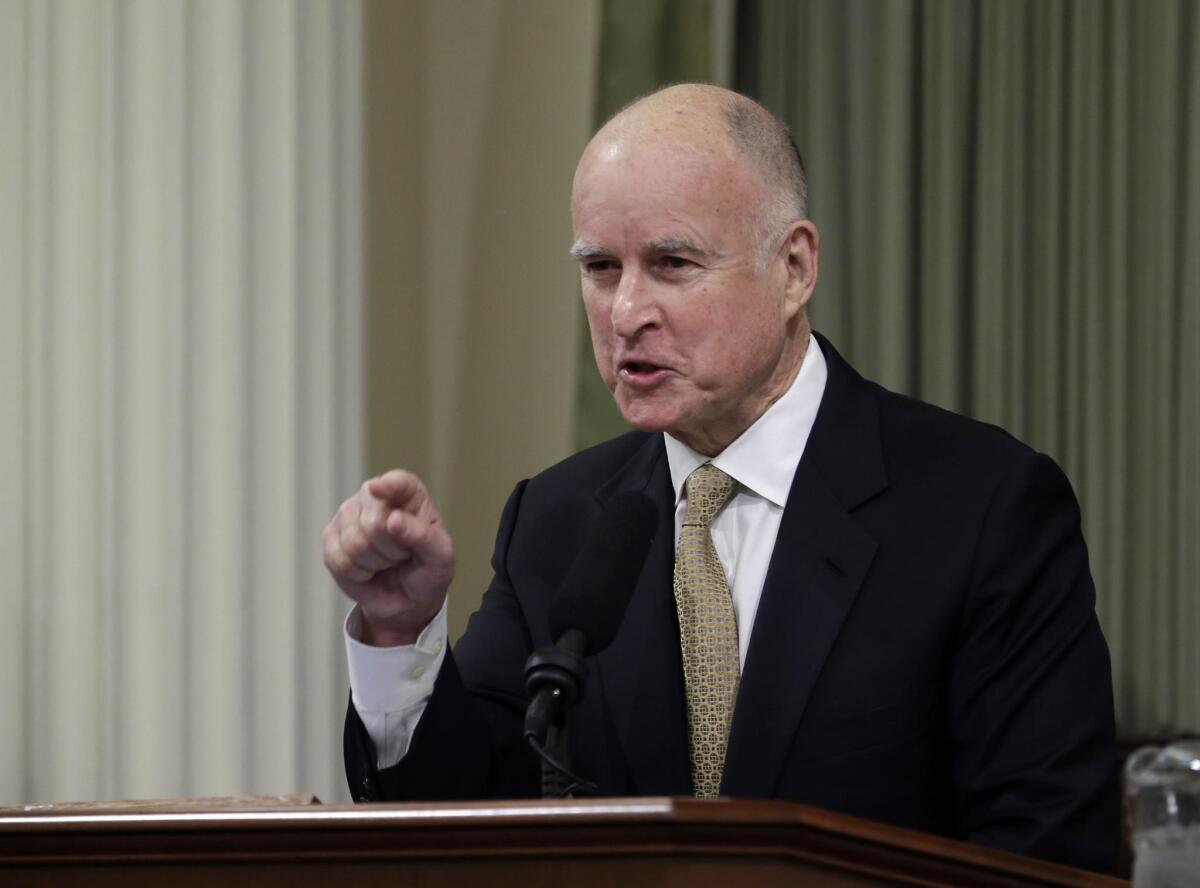
If there was an official Las Vegas betting line for the length of Gov. Jerry Brownâs State of the State speech this morning, the over-under would probably be around 15 minutes.
Brownâs version of the annual address has tended to be more succinct than stemwinder. And unlike many of his predecessors, this governor generally eschews new policy proposals in the State of the State. The safe bet is that heâll again preach fiscal discipline while outlining other issues on which heâs been focused.
Rep. Loretta Sanchez says the U.S. Senate needs a Latina -- and has someone in mind
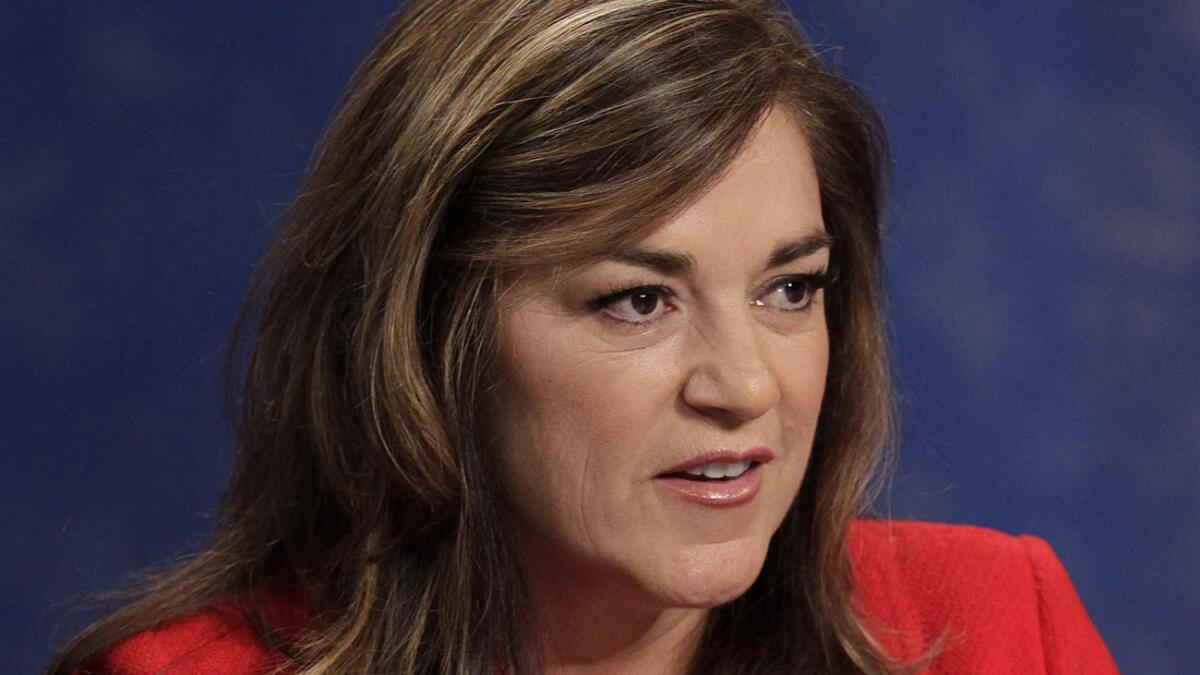
Orange County Rep. Loretta Sanchez, a Democrat running for U.S. Senate, on Wednesday criticized Congress for failing to understand the Latino community and the importance of the nationâs relationships with Central and South American countries.
Her solution? âI think we need a Latina in the U.S. Senate,â Sanchez said at a Senate candidate forum hosted by the Latino Journal in Sacramento Wednesday.
Sanchez, switching between English and Spanish, spoke of her experiences in dealing with Central and South American leaders and knowledge of the issues they face.
Few senators have made âbuilding bridges to the southâ a priority, despite the benefits to our nationâs business, public policy and military interests, she said.
A daughter of Mexican immigrants, Sanchez burst into national politics by ousting ultra conservative Republican Rep. Bob Dornan from Congress in 1996, a major political breakthrough for Latinos in California.
The race to succeed Democratic incumbent Barbara Boxer, who is not seeking reelection, is the first statewide contest for Sanchez, a member of the House Armed Services and Homeland Security committees.
Speaking to reporters after the forum, Sanchez emphasized that she is the only candidate in the race with an expertise on global security and an understanding of how Washington works.
According to a Field Poll released earlier this month, Democratic rival Attny. Gen. Kamala Harris leads Sanchez, 27% to 15% among Californians likely to vote in the primary.
Harris was in Stockton for a previously scheduled campaign event on Wednesday and could not attend.
It was judgment day for dozens of bills in the Legislature
State lawmakers faced one of the final major hurdles in clearing legislation before an end-of-month deadline.
The powerful Appropriations committees met Thursday to determine the fate of dozens of bills, most of them carryover proposals from last year that must pass their houses of origin by Jan. 31.
Several high-profile bills cleared committee, including an Assembly bill to allow ballot selfies on social media, another that would regulate the fantasy sports industry, and one that would grant families on welfare assistance a monthly voucher to buy diapers. The Assembly Appropriations committee also signed off on a bill that would allow medical marijuana dispensaries to make their sales tax payments in cash.
The Senate Appropriations Committee sent on a measure on charter bus safety that came in response to the deadly Northern California bus crash that claimed the lives of several Los Angeles-area students, but shelved a bill that would have closed a loophole in Proposition 13 that allows some commercial properties to escape reassessment if they are sold to more than one person.
The focus moves now to the Senate and Assembly floors, which must pass these bills by next week to keep them alive and move them through to the next house.
Times staff writer Patrick McGreevy contributed to this report.
Debate negotiations underway for California Senate race
Californiaâs Senate race may finally be heating up.
Democratic state Atty. Gen. Kamala Harris, the current front-runner, has agreed to take part in three proposed debates before the June primary, open to both Democratic and Republican candidates, according to her campaign.
The debates are being proposed by the Spanish-language network Univision, San Diego public radio and television station KPBS and the San Francisco Chronicle, said Harris campaign representative Sean Clegg.
Harrisâ top Democratic rival, Orange County Rep. Loretta Sanchez, doesnât want to limit the debates to just three, said campaign spokesman Luis Vizcaino.
âThis election is just too important,â Vizcaino said. âThe congresswoman is ready, willing and able to go toe-to-toe with all the candidates to discuss the issues in this election.â
A San Diego radio debate among the three major GOP candidates -- Assemblyman Rocky Chavez of Oceanside, George âDufâ Sundheim and Tom Del Beccaro -- already is in the works for Feb. 8, said Chavez campaign manager Matt Shupe.
The minimum wage ballot battle begins
In an election thatâs widely believed to be chock full of ballot measures, a battle to raise Californiaâs statewide minimum wage is shaping up to be one of the marquee fights.
A labor union representing healthcare workers began submitting signatures on its minimum wage initiative this week, with events in Sacramento and Los Angeles on Wednesday and a kickoff event in San Francisco the day before.
Low-wage workers are âtrapped in a cycle of poverty,â said Georgette Bradford of Service Employees International Union-United Healthcare Workers West in an event at the Sacramento County Office of Elections.
The initiative sponsored by SEIU-UHW would raise the stateâs minimum wage to $11 an hour in 2017 and then add a dollar a year until it hits $15 an hour in 2021. Future increases would be linked to inflation.
âThe gap between the rich and the poor is not acceptable, no more,â said Lino Pedres of the Sacramento Central Labor Council.
SEIU-UHW reports more than 600,000 voter signatures were collected. It will need 366,000 valid signatures to get the wage hike on the November ballot.
Still unclear is what happens if a competing minimum wage measure, backed by SEIU California, also makes it to the ballot. That proposal would push the wage to $15 an hour a year earlier while also mandating at least six paid sick days for all full-time jobs. Both measures count many of the same supporters, including Lt. Gov. Gavin Newsom.
Watch replay of Gov. Brownâs State of the State
Gov. Jerry Brown delivered his 13th State of the State address Thursday morning.
Our politics team will continue to offer full coverage and analysis of the speech, an annual address delivered from the Assembly chamber at the state Capitol. You can also keep up to date via our Twitter feed, and get a daily dose of politics and government news from our Essential Politics newsletter.
Republican Senate candidate Duf Sundheim bucks GOP party line, to a point
Republican George âDufâ Sundheim, who is running to succeed the retiring Barbara Boxer in the U.S. Senate, on Wednesday cast himself as a reformer with the political tools needed to help the working class.
Sundheim, appearing at a Senate candidate forum hosted by the Latino Journal in Sacramento, also criticized the Affordable Care Act, known as Obamacare, as a â1930s solution to a 21st century problem.â
But he added that it shouldnât be scrapped until a better solution to address Americansâ healthcare needs is in place. He also wants to keep coverage for preexisting conditions and a provision that allows parents to keep their children on their healthcare insurance plans until they turn 26.
âI want to make sure that what we do ... is better than what we got,â Sundheim said.
Sundheim, an attorney who lives in Los Altos Hills near San Jose, led the California Republican Party from 2003 to 2007, a period that included the recall of Democratic Gov. Gray Davis and the election of Gov. Arnold Schwarzenegger, a Republican, as his replacement.
On Monday he launched a statewide campaign swing that will take him from the Oregon border to San Diego.
Although he is a fiscal conservative, he diverges from party orthodoxy on many core issues. At the forum, he said he supports a âpathwayâ to legal status for some immigrants living here illegally.
He touted his work to retool San Joseâs pension system for public employees and to take the task of drawing lines for Californiaâs political districts out of the hands of state politicians. Sundheim said he also will support any legislation that eases the âsqueezeâ on the working class, even if itâs proposed by Democrats.
GOP Senate candidate Rocky Chavez takes shots at rivals
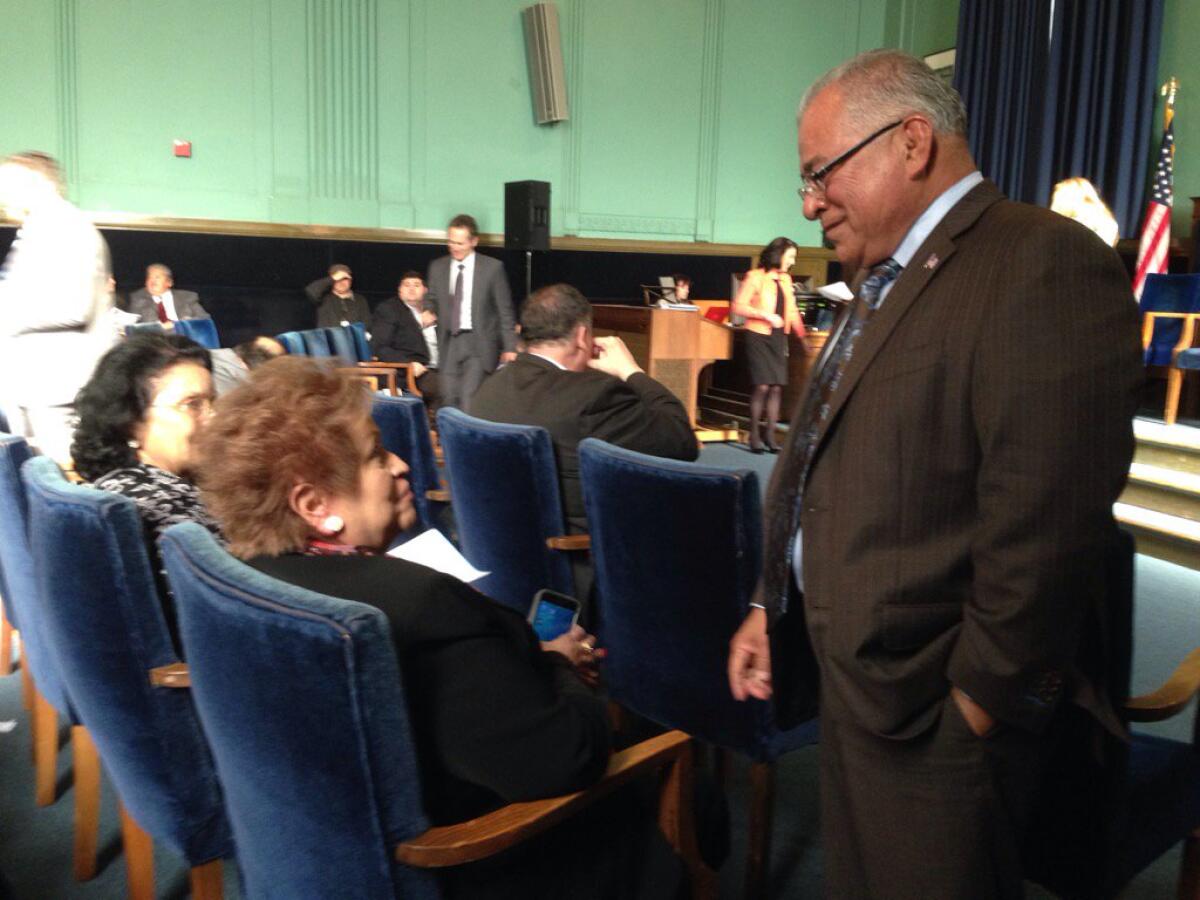
Republican Senate candidate Rocky Chavez, a state assemblyman from Oceanside, threw some sharp elbows against his political rivals on Wednesday and criticized the rhetoric of some GOP presidential candidates on immigration.
Chavez, appearing at a candidate forum in Sacramento sponsored by the Latino Journal, said California voters would be ill-served by electing an âaffluent attorney from the Bay Areaâ to represent them in the Senate. Both of Chavezâs GOP opponents â George âDufâ Sundheim and Tom Del Becarro â are Bay Area attorneys.
Chavez also lashed out at state Atty. Gen. Kamala Harris, the front-runner in the race to replace Sen. Barbara Boxer, for appealing a Los Angeles County judgeâs ruling that threw out the stateâs tenure process for grade school teachers. Chavez accused her of putting the interests of California teacher unions above those of schoolchildren who deserve a quality education.
Senate candidates Rep. Loretta Sanchez (D-Orange) and Sundheim also are scheduled to appear at the candidate forum on Wednesday.
Chavez, a self-described fiscal conservative and social moderate, served in the U.S. Marine Corps and on the Oceanside City Council before being elected to the Assembly in 2012.
On immigration, one of the most contentious issues in the going presidential campaign, Chavez runs counter to the hard-line positions of GOP candidates Donald Trump and Texas Sen. Ted Cruz. Instead of deportation, Chavez believes there should be a pathway to legal residency for immigrants who are in the country illegally.
âAs a party of family values, why would we support policies that would send mothers and fathers away from their children?â Chavez said.
Given the stateâs Democratic tilt, Republicans face an uphill challenge in the Senate race.
A Field Poll released this month showed Chavez leading the Republican field. According to the survey, 7% favored Chavez, compared to 3% apiece for GOP rivals Sundheim and Becarro, both of whom are former chairs of the state Republican Party.
The Republican candidates trail far behind the top Democrats in the race, however. Harris led the field with 27% support from likely voters, and Sanchez had 15%.
New bill could allow drivers to keep parking at broken meters
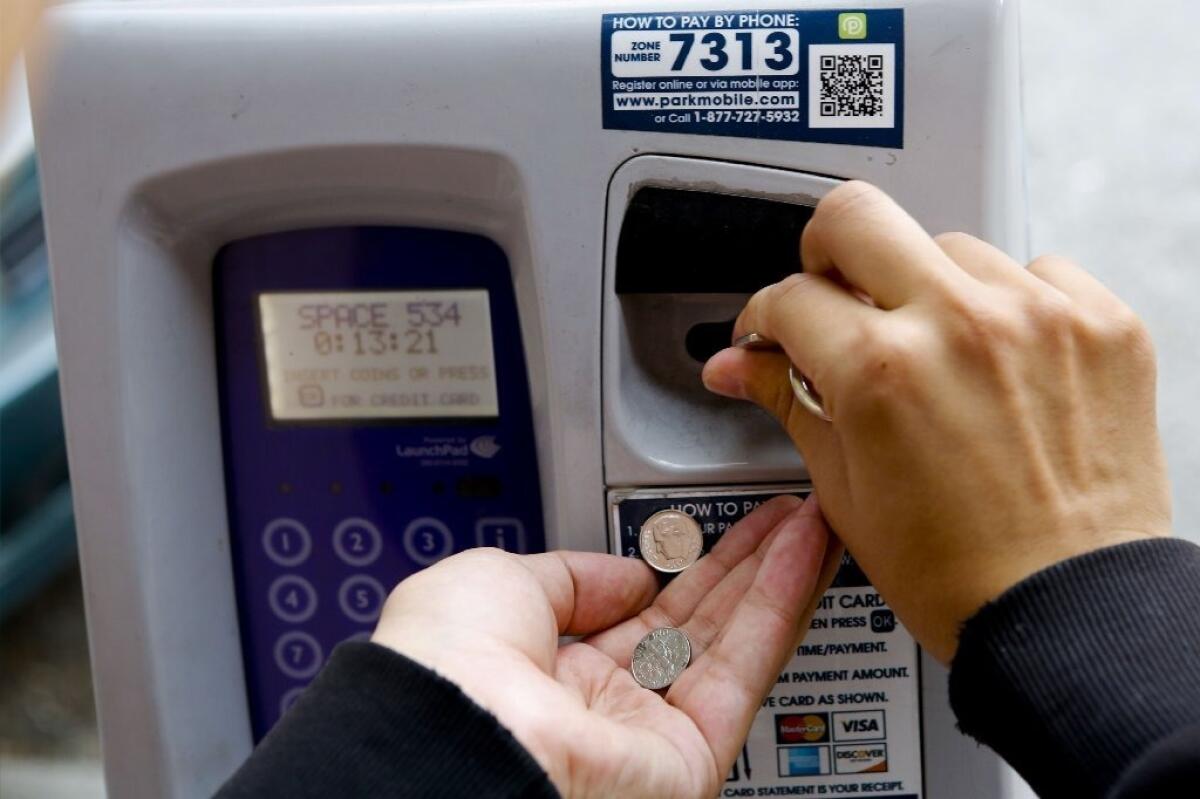
A new bill slated to be introduced this week by Assemblyman Mike Gatto (D-Glendale) would make permanent a state law that bars cities from ticketing cars at broken meters.
The existing law, which Gatto helped pass in 2013, allows drivers to park at a broken meter for the posted time limit, but will sunset at the end of this year.
âMany cities were concerned that my original bill would promote vandalism as a means to avoid paying for parking,â said Gatto. âI have yet to hear any stories of people carrying sledgehammers or baseball bats in their cars to break meters and park for free.â
The issue had been contentious in the city of Los Angeles, which continued to issue tickets to drivers parked at broken meters right up until the law was passed. Days before Gov. Jerry Brown signed it into law, the L.A. City Council voted to stop enforcing the ban on parking at broken meters, saying it was no longer necessary due to the cityâs use of newer, more reliable âsmart meters.â
Gattoâs new bill also seeks to bring other changes to parking laws, including banning valet parking operators from blocking access to metered spots and loading zones, requiring cities that install smart meters to consider demand-based pricing, and limiting towing and storage bills if a driverâs car is illegally dumped or parked as a result of a crime beyond the ownerâs control.
Gavin Newsom doubles down on minimum wage initiatives
Two pending 2016 ballot initiatives to hike the minimum wage have a lot in common: they would both raise the wage to $15 an hour, theyâre both backed by powerful labor groups and theyâre both endorsed by Lt. Gov. Gavin Newsom.
In November, Newsom endorsed a measure by SEIU-United Healthcare Workers that would raise the minimum wage to $15 by 2021. He appeared in San Francisco Tuesday as proponents began submitting signatures to qualify for the ballot.
Backers of a rival initiative announced Tuesday that they, too, had scored Newsomâs support. That plan, by the SEIU California State Council, would raise the minimum wage to $15 by 2020, as well as mandate at least six paid sick days per year. Proponents are currently gathering signatures for that measure.
âThe lieutenant governor supports raising the minimum wage--period,â said Rhys Williams, a spokesman for Newsom, when asked about the dual endorsements.
Steve Trossman, a spokesman for SEIU-UHW, said Newsomâs blessing of a rival proposal was not a surprise.
âHeâs a big supporter of raising the minimum wage to $15. We certainly expected him to support any effort to do that,â Trossman said.
Legislators get first look at Gov. Jerry Brownâs budget
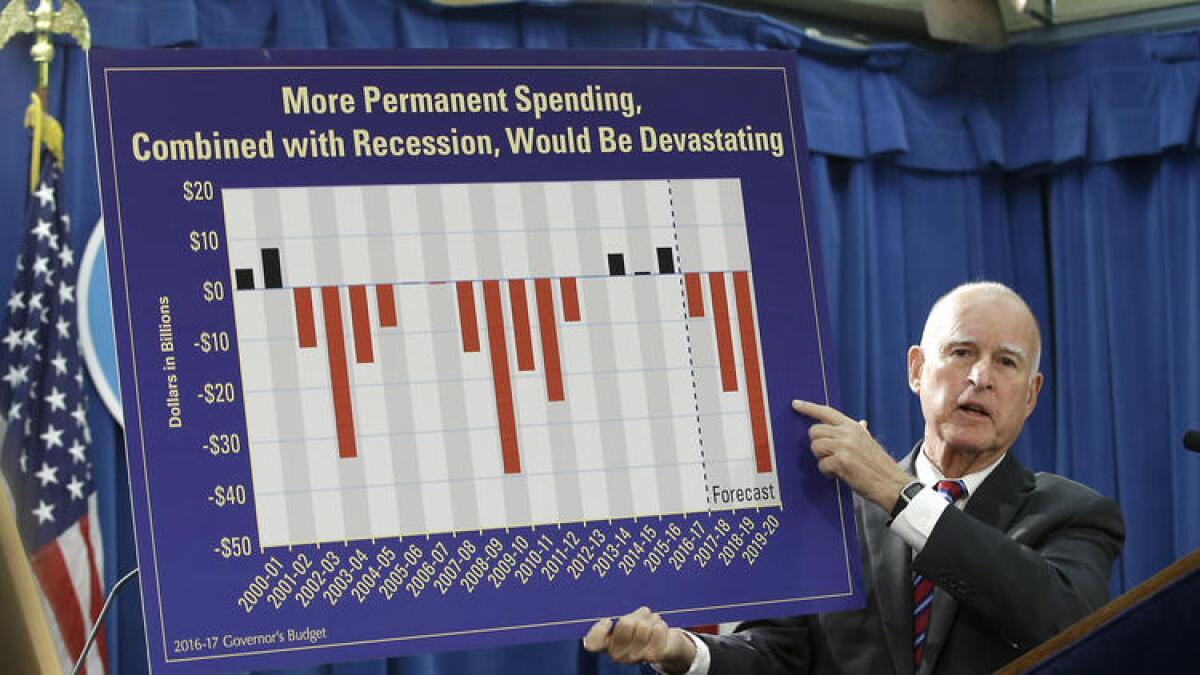
Budget-writing legislators took their first look at Gov. Jerry Brownâs spending plan on Tuesday, taking notable aim at his call for an extra rainy-day fund payment of $2 billion in surplus revenues.
âThat, I think will be part of the playing field as to our debate,â state Sen. Mark Leno (D-San Francisco) said of the governorâs effort to save instead of spend that cash.
In the budget he unveiled on Jan. 7, Brown estimated an additional $5.9-billion in tax revenues since he signed a plan into law last June. Much of that money goes, by law, to either education for kindergarten through community college or a guaranteed rainy-day fund. But the $2-billion he wants to set aside would be optional, even as some legislative Democrats insist more can be done on social services programs.
Sen. Holly Mitchell (D-Los Angeles) told the governorâs deputy budget chief that Brownâs plan is âcompletely silentâ on providing needed help to children of low-income families through programs like CalWORKs.
And the hearing included a robust discussion of how budget revenues are forecast, a part of the annual fiscal fight that Brown has dominated since returning as governor in 2011.
âWhat really is one-time revenue?â asked Leno, the chairman of the Senate budget committee, in reference to Brownâs assertion that current revenue levels are an anomaly and not something on which to count.
Assembly budget writers will take their first look at the plan on Wednesday.
Legislature hits 3,000 bill mark for current session
Although most observers see the work of the Legislature in terms of annual efforts, legislative sessions actually last two years. And using that lens through which to view the statehouse, legislators have introduced a lot of proposed laws since taking the oath of office in January 2015.
Public database information shows the total number of bills introduced as of last week at 3,001 in the two-year legislative session. The vast majority of those â 2,772 bills â were introduced in the first year of the Legislatureâs work.
Lawmakers have about another three weeks to formally introduce bills in 2016. They also face a firm deadline at the end of this month to push bills out of their house of origin.
Of the 229 bills introduced so far this year, most of them â 139 bills â have been introduced in the Assembly.
Teachers union rules and more in this weekâs podcast
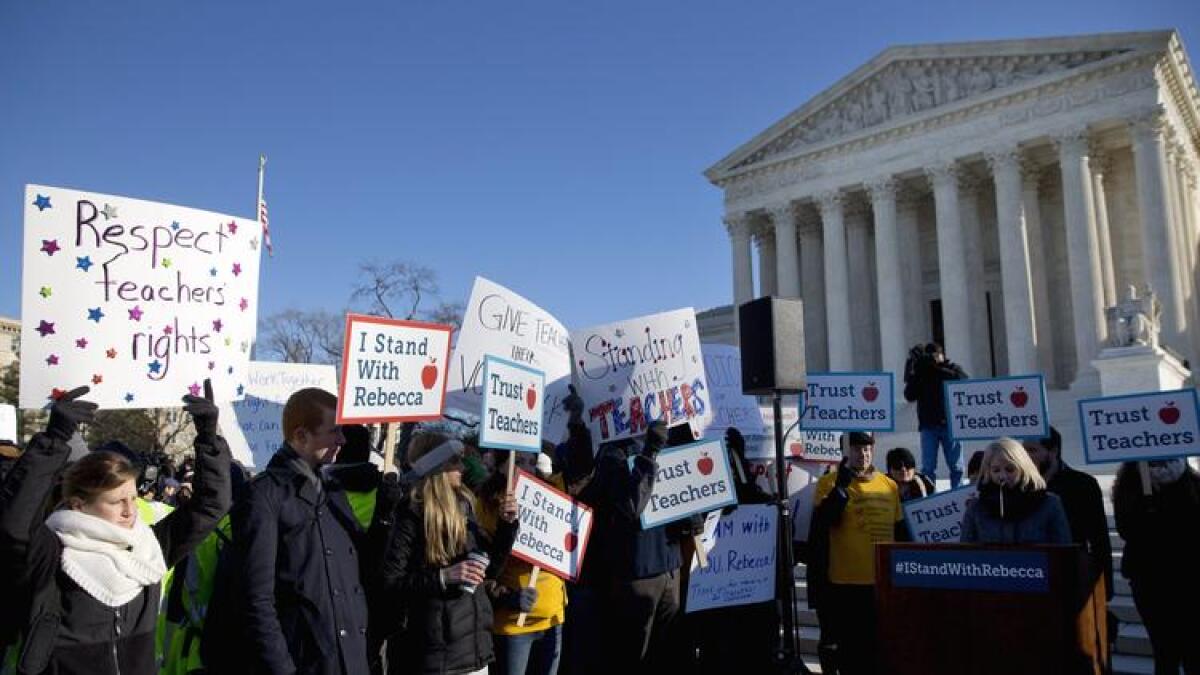
Few political players command the same level of attention as the California Teachers Assn., which explains why everyoneâs so closely watching the case now before the U.S. Supreme Court.
This weekâs California Politics podcast takes a closer look at the political implications of the court battle, as well as some of the early maneuvers over legislation in Sacramento and the soon-to-arrive speakership of Assemblyman Anthony Rendon (D-Lakewood).
Listen here, or subscribe to the free podcast on iTunes.
GOP Senate candidate Duf Sundheim riles up tea party group, and not in a good way
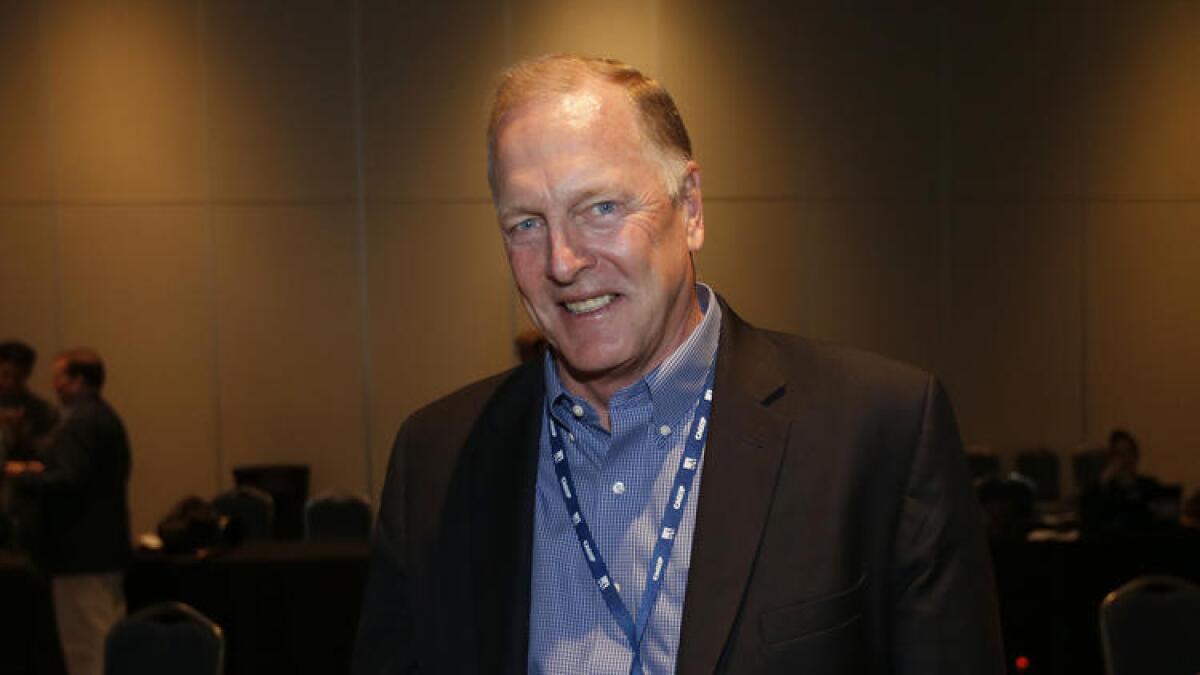
California Republican Senate candidate George âDufâ Sundheim, who launched a campaign swing from the Oregon border to San Diego this week, hit a rough patch Monday night when speaking to the Redding Tea Party.
When asked about federal immigration policy, Sundheim said he supported tougher border security but that it wasnât âpracticalâ to deport the estimated 11 million immigrants in the U.S. without proper documents.
That was greeted with an expletive from one tea party member. Others stood up from the pews inside the Destiny Fellowship Church, where the nighttime gathering was held, and walked out.
âObviously I cleared out the room tonight,â Sundheim told the few who remained.
Sundheim, a lawyer from the Silicon Valley and former chairman of the California Republican Party, said he realized he might be walking into an unfriendly environment.
After he took the microphone, was questioned about why he did not mention God when he spoke of his priorities in life. He answered that he is a man of faith but believes his religious beliefs are a personal matter,
âWe have a Muslim problem now. You have to step up,â one tea party member told him in response.
The Redding Tea Party includes a substantial contingent of members who support the long-standing idea of northern counties breaking away from California to form the new state of Jefferson.
Terry Rapoza of Redding, who supports the Jefferson movement because he feels northernmost Californians have no legitimate voice in state government, was critical of some of Sundheimâs views but said it took some guts to show up.
âHe meant well,â Rapoza said.
Sundheim received much warmer greetings earlier in the day when the spoke to Republicans in Yreka and an event hosted by the Shasta County Republican Central Committee.
Many of the questions at those campaign stops centered on federal land-use restrictions, which those attending said have decimated the regionâs timber and mining industries and now threaten farmers and ranchers.
Sundheim was sympathetic and supportive, and promised to do whatever he could to address those issues if elected in November.
A Field Poll released this month showed Sundheim and the two other major Republican candidates trying to succeed the retiring Barbara Boxer in the U.S. Senate lagging behind two Democrats in the race.
Democratic state Atty. Gen. Kamala Harris led the field with 27% support from likely voters, leading Democratic rival Rep. Loretta Sanchez of Orange County, who had 15%.
Following behind was state Assemblyman Rocky Chavez (R-Oceanside) with 7%. Sundheim and Tom Del Beccaro, who also once served as state GOP chairman, both had 3%, according to the poll.
No penalty for pot tax payments in cash?
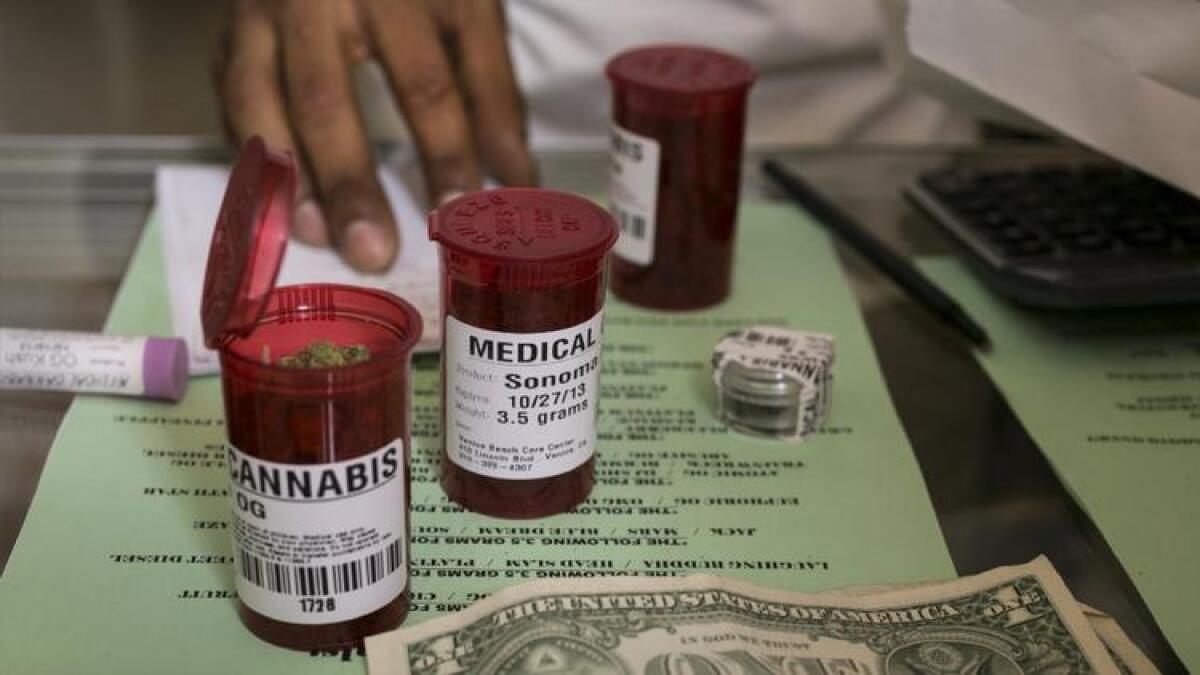
As Californiaâs marijuana industry comes under both new state regulation and looks towards a possible full legalization after the 2016 election, one problem remains persistent: itâs a business almost completely done in cold, hard cash.
Thatâs presented problems when it comes to paying state sales taxes, businesses owing $10,000 or more a month are generally required to pay by electronic funds transfer (EFT) from a financial institution.
This week, a late effort to help medical marijuana dispensaries moved forward in the Assembly. AB 821, a newly amended bill by Assemblyman Mike Gipson (D-Carson), would allow the state Board of Equalization to accept non-EFT payments from pot dispensaries.
The bill cleared its policy committee on Monday without any formal opposition. Though itâs a new policy idea, Gipson placed it inside a bill from 2015, a âgut and amendâ of an existing bill. That means the bill needs to clear the Assembly by the end of this month.
While the state made major progress on creating new rules for medical marijuana in 2015, observers have noted the larger issue is how to bring the industry into the world of banking. Federal drug laws have made that a non-starter.
Planned Parenthood videos prompt new California bill
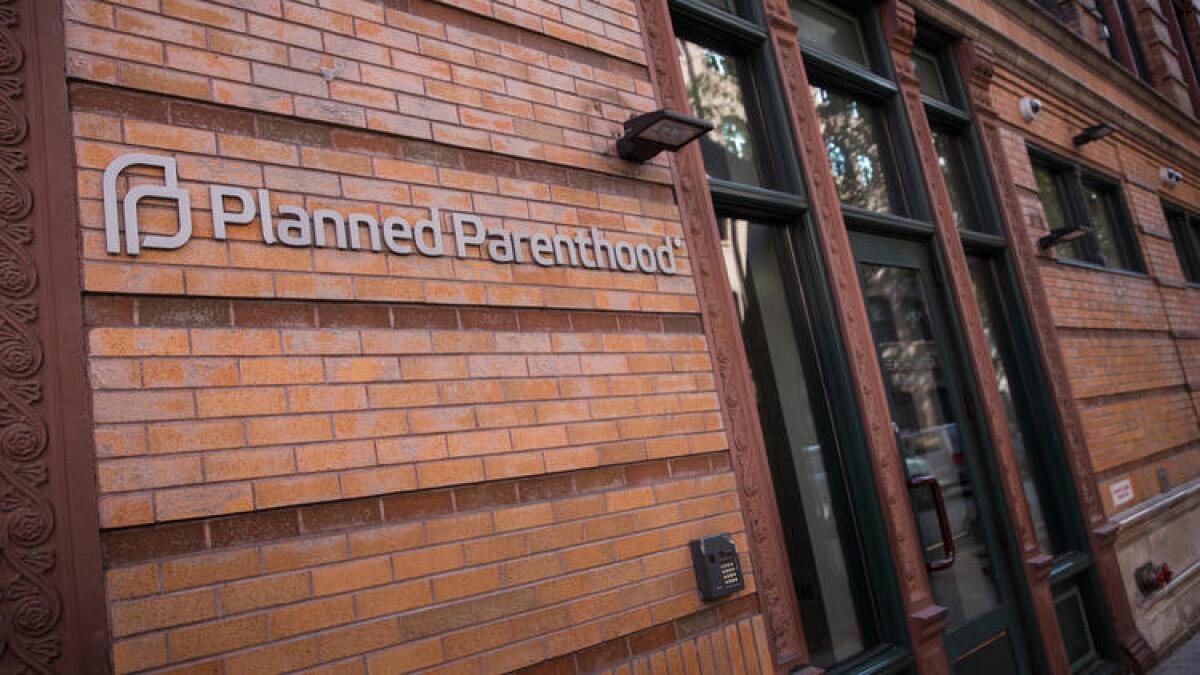
A controversial series of secretly recorded videos released by antiabortion activists last year has inspired a new privacy measure by a Democratic assemblyman.
Assemblyman Jimmy Gomez of Los Angeles introduced a measure Friday that would prohibit someone from distributing a video recording of a confidential communication, without getting the consent of all parties involved.
The videos released by the Center for Medical Progress purport to show Planned Parenthood doctors discussing the sale of tissue from aborted fetuses for research. The activists claim the recordings show the group profiting from such tissue sales; Planned Parenthood officials have said the videos were deceptively edited and the footage was illegally obtained.
It is generally illegal in California to record a conversation without permission of all involved parties. Atty. Gen. Kamala Harris said last year she would look into violations of state law.
Gomez has yet to fill in many of the specifics of his bill, AB 1671; he said he wants to make sure his proposal does not impede the work of the press or law enforcement.
But he said he wants to craft legislation that would deter someone from releasing video they know was recorded without the necessary permission.
âThe law has never been really updated to take into account the new technologies we have...[people] being able to disseminate something rather rapidly,â Gomez said.
Referendum to overturn aid-in-dying bill fell far short
Itâs official.
An effort to qualify a referendum to overturn Californiaâs new aid-in-dying bill has failed.
The raw count by Californiaâs 58 counties found only 156,815 signatures were turned in, less than half of the 365,880 needed for the referendum to make the November ballot.
Earlier this month, backers of the referendum admitted that they were going to come up short.
On Friday, the secretary of stateâs office sent out a public notice declaring that the signatures are âless than 100 percent of the number of qualified voters required to find the petition sufficient; therefore, the petition has failed.â
Bigger school buffer for slow traffic, says legislator
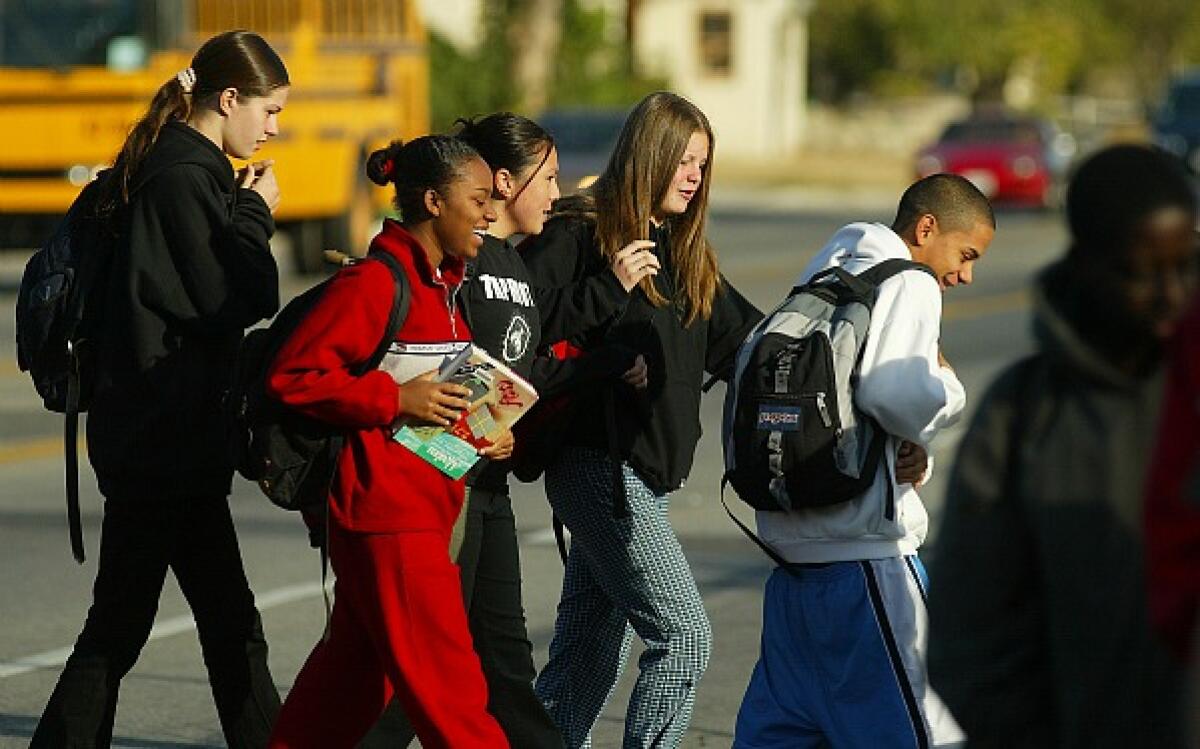
Drivers approaching a public school would have to slow down as much as a mile away under legislation introduced this week at the state Capitol.
The bill by Assemblymember Freddie Rodriguez (D-Pomona) would expand what are known as school safety zones, and would give local communities the power to make the biggest zones for areas where traffic surveys show theyâre most needed.
AB 1659 would require a slow driving zone a quarter-mile away from a school, a slight increase from the current maximum of 1,000 feet.
Rodriguezâs effort seems prompted by the 2014 hit-and-run in Upland that killed an eleven-year-old boy who was walking to school.
âThat tragedy is still fresh in my mind,â said Rodriguez in a written statement. âThe current school zone boundaries are insufficient and do not go far enough to protect children who walk and bicycle to school.â
Latino legislative leader backs November school bond
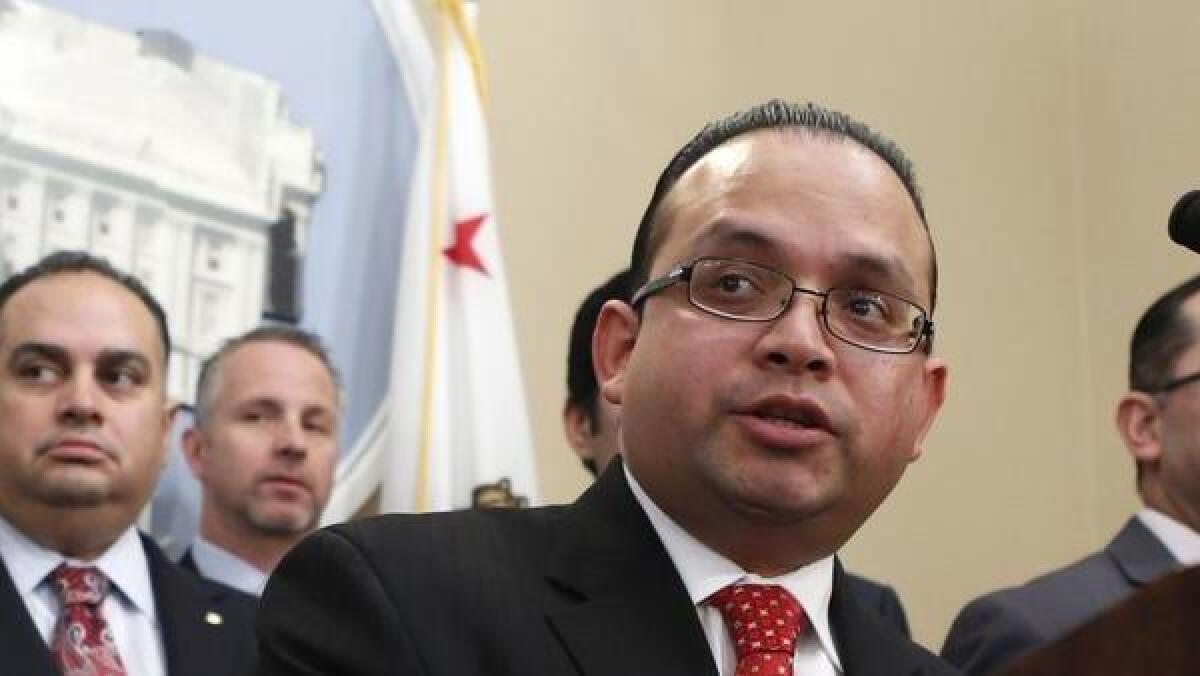
Itâs not surprising that prominent legislators are in favor of a statewide school bond to kickstart dozens of projects lacking the money to get going.
But this is not an ordinary year for a school bond, and sides are being chosen in whether a school bond should come from the Legislature or from backers of an initiative thatâs already secured a spot on the November ballot.
Assemblyman Luis Alejo (D-Salinas), chair of the Latino Legislative Caucus, endorsed the initiative version of a school bond on Thursday.
âPassage of a state school bond in November will make sure all students have access to safe schools with the facilities needed to guarantee access to a quality education,â he said in a statement released by the bond measureâs backers.
Rewind to last week, when Gov. Jerry Brown made it clear during his state budget event that heâd prefer to have the Legislature push a school bond measure forward for the June 7 election -- one thatâs smaller in size than the $9 billion effort backed by the building industry and one with some different priorities for how the money would be doled out.
The news that Alejo is blessing the November version is a reminder of the complicated politics that lie ahead in the next few weeks. The backers of the November bond tried, unsuccessfully, to get legislators and Brown to embrace a school bond in 2013 and 2014. They gathered voter signatures after being rebuffed in the state Capitol. And itâs unclear whether theyâre willing to reconsider a statehouse effort and the negotiations it would require.
Legislators meet in rare Friday sessions

Californiaâs state constitution allows legislators to receive a cash per diem payment, a salary supplement designed to offset the expenses of being away from home, but only as long as thereâs no more than a three day break in their work in Sacramento.
Legislators are usually away from the statehouse on Fridays, but Monday is a holiday and the three day limit would suspend the per diem cash.
And that explains why both houses convened today for brief, perfunctory sessions. Thus, the current $176 a day per diem payments keep coming.
An analysis by top legislative staff, submitted in 2011 to the independent Citizens Compensation Commission, found that there were about 200 days in most years of legislative sessions.
Itâs worth noting that not all legislators accept the supplements, especially those who live closer to Sacramento. Nonetheless, the payments have long raised the ire of some legislative critics.
By late morning, both the Assembly and Senate had made quick work of their light calendars, focused on announcements, introductions, and speeches in honor of the late Rev. Martin Luther King, Jr.
Legislators will be back on Tuesday, facing a big deadline for bills introduced in 2015 to clear fiscal committees.
California voters split on eliminating death penalty, poll finds
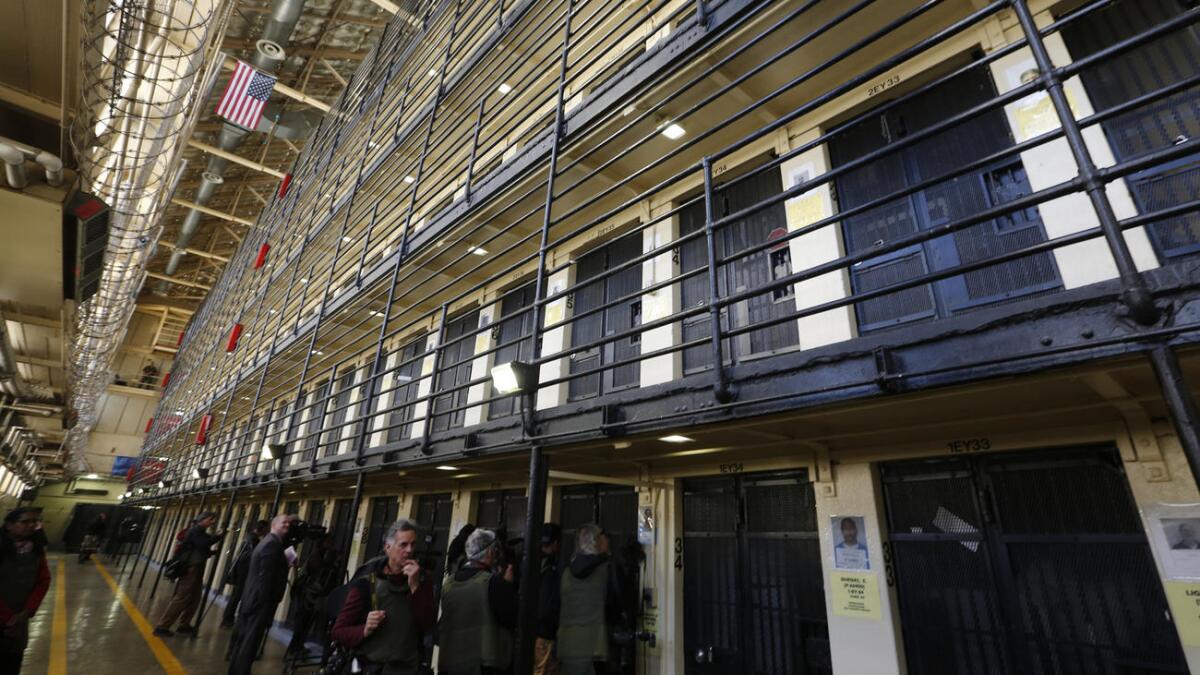
California voters are almost evenly split between separate proposals to eliminate the death penalty or speed up executions, according to a new Field Poll.
The survey showed that 47% of registered voters support ending the death penalty and replacing the punishment with life-in-prison without the possibility of parole. Among those surveyed, 48% favored taking steps to speed up executions.
The findings showed a sharp division along party lines. Among Democrats, 60% favored doing away with the death penalty, compared to 22% of Republicans. Fifty-two percent of independent and other party voters supported ending executions.
Among Republicans, 73% supported speeding up executions, compared to 34% of Democrats and 44% for independents and other voters.
California voters in November may be asked to decide two different death penalty ballot initiatives.
One, backed by San Francisco-based Death Penalty Focus and actor Mike Farrell of M*A*S*H fame, would convert all death sentences to life without parole. San Bernardino County Dist. Atty. Mike Ramos is championing another initiative that seeks to cut by half the time from conviction to execution. The goal is between 10 and 15 years.
Since the death penalty was restored in California in 1978, more than 900 people have been sentenced to death but only 13 have been executed. The state has not had an execution since 2006.
There are 746 prisoners condemned to death in California, including 21 women, according to the California Department of Corrections and Rehabilitation.
The Field Poll was conducted from December 15 and January 3 among 1,003 registered voters in California. the margin of error is 3.2%.
Lawmakers support mandate for training medical pot workers
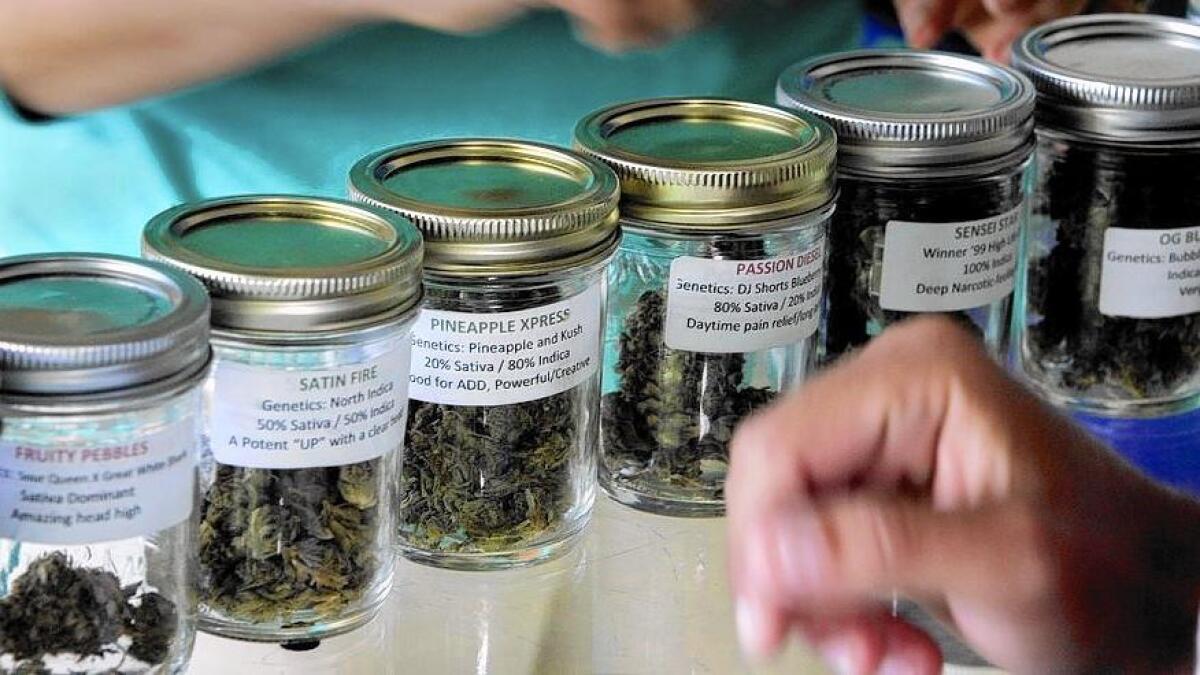
Just months after approving a system for licensing and taxing the medical marijuana industry, California lawmakers on Tuesday took follow-up steps to require that workers get training in the safe and secure handling of cannabis.
Those who are licensed to grow, transport and sell medical pot starting in 2018 would be required to provide training to their employees on issues including patient safety, under a measure approved by the Assembly Business and Professions Committee.
âThese workers and the public need to know that they are educated in the best possible health, safety and security standards set by the state,â said Assemblyman Reggie Jones-Sawyer (D-Los Angeles), who authored AB 26.
Legislators and Gov. Jerry Brown approved a new state bureau in October to oversee the industry.
The bill was proposed by the United Food and Commercial Workers Union, Western States Council, which represents about 1,200 cannabis workers. Assemblyman Brian Jones (R-Santee) withheld his vote, citing concern that it could help the union cement its leading role in unionizing workers in the industry. Union officials said the bill has no impact on which union will organize workers.
After Gov. Jerry Brown raises concerns, tax backers revamp initiative
Supporters of extending a tax on Californiaâs highest earners have reworked their proposed ballot initiative to address what Gov. Jerry Brown last week called a âfatal flaw.â
Under the amended ballot measure â which would continue income taxes approved by voters in 2012 under Proposition 30 â the new revenues would be subject to Californiaâs rainy-day fund requirements.
Brown criticized an earlier version of the initiative, which exempted such revenues from the budget reserve, as defying the will of the voters, who approved the stricter saving measure in 2014.
Gale Kaufman, a Democratic strategist running the initiative campaign, said the changes were made in response to Brownâs comments last week.
âWe believe this goes a long way in taking his concerns seriously and addressing them,â Kaufman said. âWe look forward to future conversations with him and his office.â
As Gov. Brownâs budget is unveiled, everyone knows schools will do well
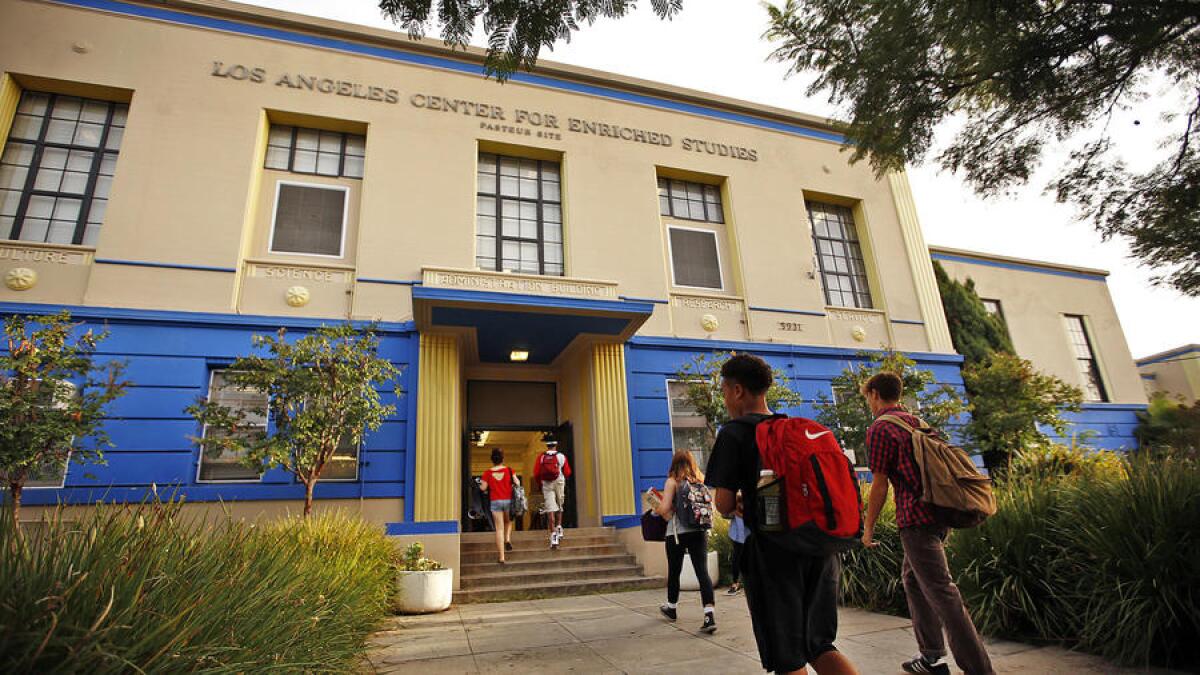
You donât have to be a Capitol insider with exclusive knowledge of Gov. Jerry Brownâs state budget to know this: California schools are going to do well in the new spending plan.
The simple reason, of course, is that K-12 schools and community colleges have a voter-approved earmark of tax revenues, and everyone knows those revenues are coming in above last yearâs predictions.
âIt is safe to say this will be the second-best year for schools in a decade,â said Kevin Gordon, a longtime education lobbyist.
Public schools usually get roughly about 40 cents of every tax dollar in the stateâs general fund, by far the largest piece of the pie. Even in bad years, the Proposition 98 mandate often triggers an IOU to schools once the economy recovers.
A November report by the independent Legislative Analystâs Office estimated that current revenue collections will trigger about $700 million more in school spending this year than what was assumed in the budget lawmakers enacted last year. And because the Proposition 98 law is so broad, it will no doubt trigger additional dollars that are counted under previous tax years.
Weâll know the real numbers once the governor takes the stage in the Capitol briefing room at 10 a.m., but you can bank on it being a good day for public schools.
Orange County assemblyman rolls out pro-Israel bill
Assemblyman Travis Allen (R-Huntington Beach) made good on a promise that heâd put forth pro-Israel legislation in the new year.
His bill calls on the state to divest from all companies that boycott Israel. AB 1551 would require state contractors to certify they are not participating in boycotts âor any discrimination against Israel,â Allen said in a statement.
âThe United States and Israel have historically stood together as allies due to our unique bond founded on shared values, a bilateral trade relationship, and our unwavering commitment to freedom and democracy,â Allen said. âIt is unconscionable for our state to do business with companies that play politics and boycott our critical allies.â